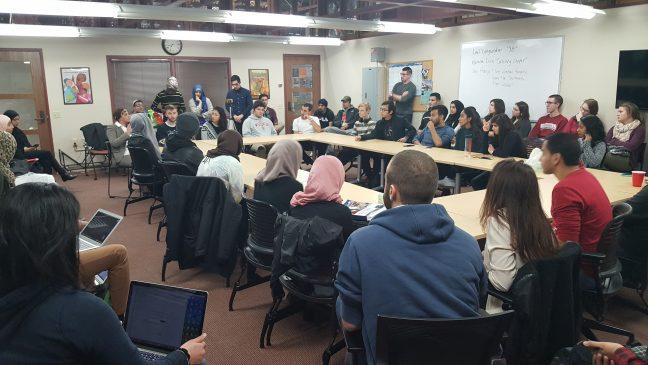In response to Tuesday’s unprecedented election results, University of Wisconsin students crowded into a room in the Multicultural Student Center Thursday evening for discussion.
The Muslim Student Association and the Indian Graduate Students’ Association reserved the space in the Red Gym for students to share their experiences and concerns regarding the results of the election and a Donald Trump presidency.
Asifa Quraishi-Landes, a University of Wisconsin law professor, led the discussion.
Students voiced concern that Trump’s election legitimizes the hateful rhetoric employed throughout his campaign.
Iffa Bhuiyan, a student, said she was most concerned for kids still in elementary, middle and high school. This population, she said, is incredibly vulnerable to bullying following Tuesday’s election results.
Bhuiyan said she wanted to understand the reasoning behind Trump supporters. She especially couldn’t understand how anyone who was friends with her or any other Muslim could cast a vote for Trump.
“If people still aren’t hearing us, what do we do?” Bhuiyan asked.
Trump, Johnson sweep Wisconsin in historic night for Republicans
Quraishi-Landes asked students if they thought people who supported Trump could learn to empathize with minorities if they got to know them personally.
Students seemed doubtful, with Bhuiyan drawing on a recent Facebook message exchange to illustrate how great the divide is. A woman and Trump supporter with whom Bhuiyan had been close with in high school reached out to her via Messenger after posting a status that she didn’t vote.
Her friend proceeded to ask her to coffee, but Bhuiyan was dismayed how someone could consider herself her friend and neglect to vote.
Because of her privilege, Bhuiyan’s friend didn’t have to concern herself with the election.
“Essentially, she didn’t even have to care,” Bhuiyan said.
Fares Hasan, a sophomore at UW, voiced a similar concern, saying that individuals tend to vote in their own best interest in the first place.
“I don’t think getting to know people actually helps very much,” Hasan said.
State legislators react to Republican sweep in state, national elections
Hasan said he attended a predominantly white high school with “suburb kids.” While the school emphasized volunteering and diversity, Hasan said he didn’t think it made a difference.
“Students would put in 40 hours a semester or so [volunteering with disenfranchised communities,] but they would still have the same views,” he said.
While the room was predominantly made up of MSA and members of the Indian Graduate Students’ Association and their allies, students’ concerns about Trump’s impending presidency were not limited to their perspectives as minorities. Students cited concern over issues ranging from the environment to economics.
Fatma Said, an international student from Tunisia studying environmental conservation here at UW, said she is concerned over how this will impact the business and policy decisions of countries around the world, noting that much of the world looks to the United States as a model.
Said said she is concerned Trump’s presidency will open the door for people to destroy the environment.
If they start, Said warned, others will start.
“I don’t believe one person can have this power, like where are we?” she asked. “This generation doesn’t want war, we don’t want to invest in arms … we want peace.”













